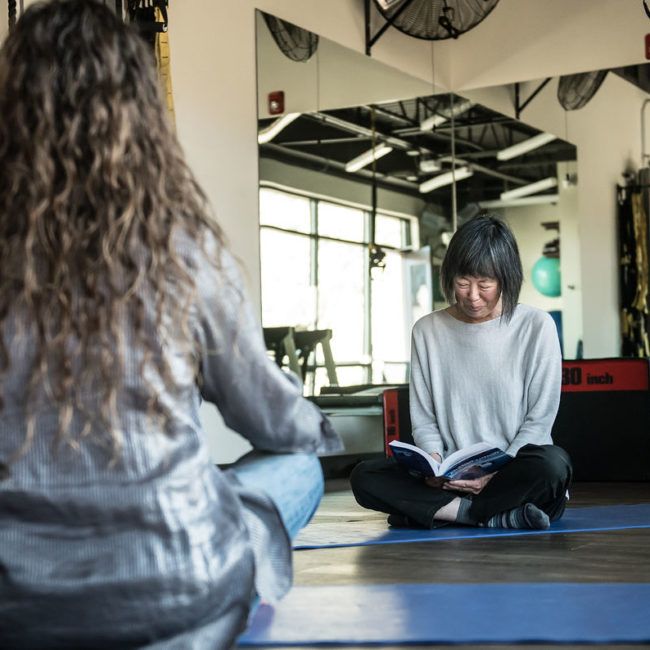Group Therapy
Create. Your. Self. - Behavior.
Think telling your problems to a group of semi-strangers sounds awful? Think again.
As humans, we need other humans. Some of us don’t like that many people and prefer the solo life, but humans are pack creatures, even when our pack is really small. We need other mammals.
Group therapy works exponentially faster than individual therapy. This is because instead of gaining the benefit from just one person (your therapist) you gain the benefit of hearing the interventions for others and doing what we call “coat-tailing”.
Coat-tailing is when you benefit from another’s psychological work in a group. As someone discusses their experience you think about your own. Then when the intervention is applied you are also thinking about how that intervention might work in your own life. Thus, you are benefiting even when you’re not the one sharing. Often the one who is coat-tailing gets more benefit than the person sharing at the moment because they are seeing a variety of narratives play out regarding the situation being discussed – their own experience, the person sharing, and any other group members who may have chimed in.
Plus … when we are struggling, we often feel very alone. Being in a group struggling with similar issues reminds us that we are not alone. That the human condition is something we all share, and that difficult experiences are not isolated to just us. This can help us take perspective. Yes, our experience is only ours and others’ experiences are uniquely theirs, however, there are many similarities in human experience. Being part of a group helps us see that we are not isolated, and others can be trusted to be there for us.
-
Women in Transition, Women's Therapy Group
-
Yoga For Mental Health
-
Studio B Group Calendar
You Are Not Alone
For many of us, we’ve been hurt by other people. Our trust has been betrayed and we feel alone as a result. In group therapy, the group members make a commitment to show up for each other. They commit to being present in the group and to holding each other accountable. They call each other out on behavior that isn’t in line with goals and celebrate each person’s successes. Being in a group helps us heal from abandonment in earlier life and build a stronger sense of self.
We build our sense of self based on 3 things. How we view ourselves, how others reflect us back to us, and the situations we find ourselves in. When these experiences are congruent, we have a stronger sense of self. Most of us have had some incongruence in our past, and those of us with a lot of incongruence and invalidation struggle to feel a sense of self at all.
Group can help us heal that hollow feeling and offer what is called a “corrective experience”. These are interventions that help us build skills and awareness we didn’t have before. In group therapy being authentically seen, heard, understood, and supported is the corrective experience many of us crave.
At Studio B, our group therapists are ready to help you find your tribe.
Our group therapists know it is difficult to come to group therapy and are skilled at helping you navigate the awkwardness of attending your first group.
Group therapy always starts with creating a structure and set of rules so we can feel safe as we share our struggles.
If the group is “closed” the same people will attend for a set amount of time.
If it is “open” new people can join at any time.
Members are screened during a therapy intake appointment to make sure they are a good fit for the group, have an idea of group expectations, and are willing to commit to the group rules.
The group format, rules, and interventions will depend on the group therapy focus. Some groups are focused on goal setting, tracking behaviors, and sharing our successes and failures. Other groups are focused on relationship issues, communication skills, and helping us connect to others.
Groups use a variety of therapy modalities and theories such as Dialectical Behavior Therapy, Cognitive Behavioral Therapy, Solution-Focused Therapy, Motivational Interviewing, Hakomi, and Systems Theory to name a few. The model and theory behind the group structure will be determined by the group therapist(s) and topic.


Next Steps
If you're ready to start, complete the steps below.
- Call Us for More Information
- Contact Us Form
- Schedule a Therapy Session
- Check the Studio B Group Programs Calendar
- Check out Studio B Programs and Services
RELATED BLOGS
Want more? Build your knowledge through our blog posts. Get passionate about your goals and CREATE. YOUR. SELF. Dedicate your time to you.
YOU MAY ALSO LIKE ...
While all services and courses are comprehensive, you can experience heightened benefits by combining services to work in unison, especially by combining work in body, behavior, and balance. Consider some of Studio B's other services and courses listed below.













